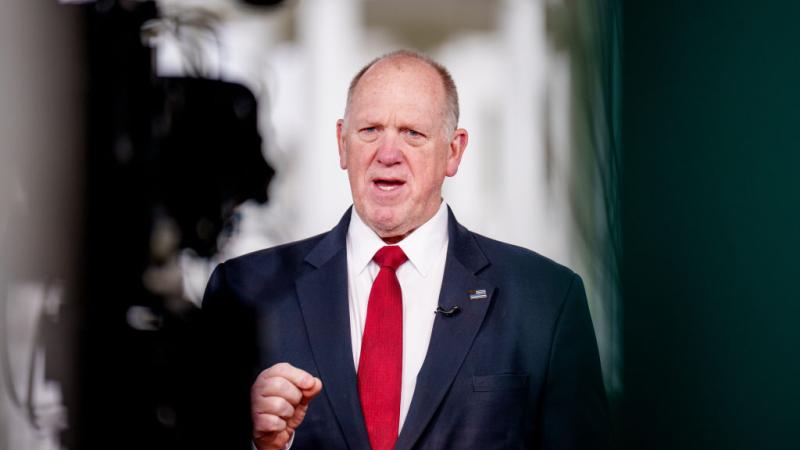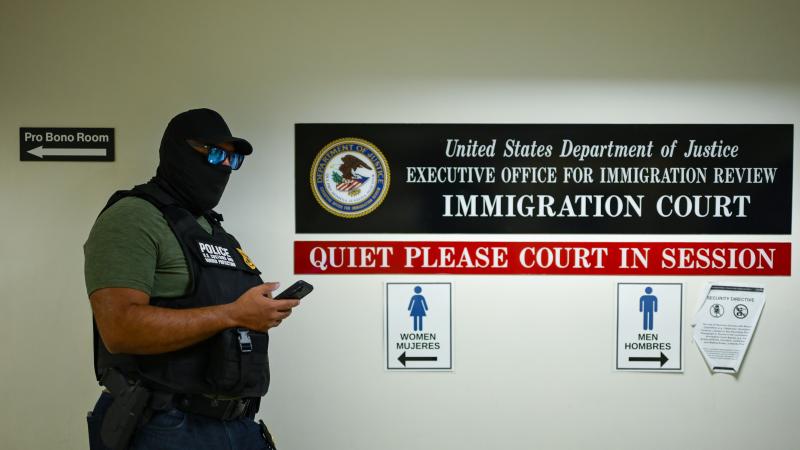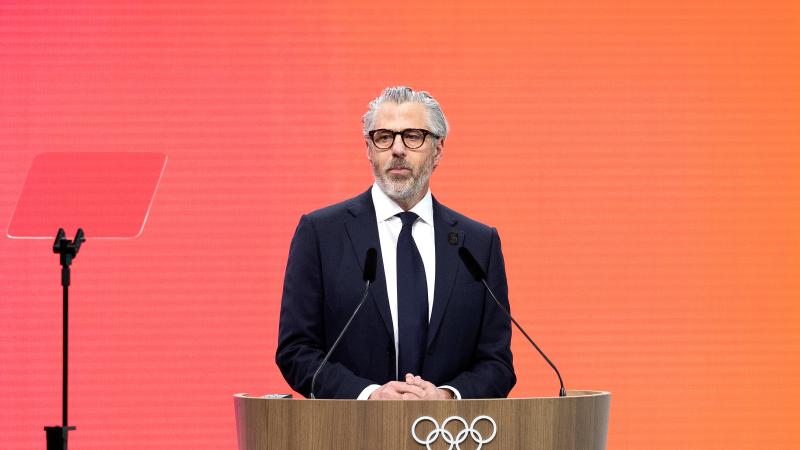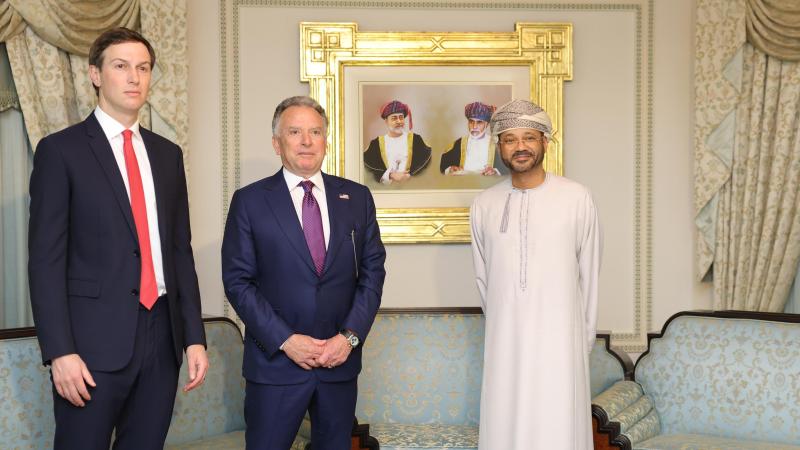Milley and his generals made mistakes leading to deadly Afghan withdrawal
As Defense Secretary Pete Hegseth leads an investigation into the U.S. military's actions during the Afghan debacle in 2021, Just the News detailed a host of evidence that shows military commanders and generals deserve their share of the blame.
Then-Chairman of the Joint Chiefs of Staff Mark Milley, then-CENTCOM Commander Frank McKenzie, and other military generals and commanders made significant mistakes during the disastrous withdrawal and evacuation from Afghanistan in 2021, a Just the News investigation has shown.
The six-part investigative series by Just the News shone a light on many previously unreported or little-known misstatements, misjudgments, and questionable decisions by U.S. military leaders during the Afghan debacle in 2021 following the Go-to-Zero order made by President Joe Biden.
President Donald Trump hosted a number of the Abbey Gate Gold Star families in the Oval Office last week on the eve of the anniversary of the deadly attack at the Kabul airport, which killed 13 U.S. service members in August 2021.
Defense Secretary Pete Hegseth, who was present for the Oval Office meeting, doubled down on his vow to hold military leaders accountable for their share of responsibility for the disastrous withdrawal and evacuation from Afghanistan.
An ISIS-K suicide bomber named Abdul Rahman al-Logari — who had been freed by the Taliban from a prison at Bagram Air Base in mid-August 2021, mere weeks after the U.S. abandoned the base — has been identified by CENTCOM as having carried out the suicide attack at Abbey Gate, killing 13 U.S. service members and an estimated 170 Afghan civilians on August 26, 2021.
Milley did not respond to requests for comment sent to him through Princeton University, where he was named a visiting professor last year, and through JPMorgan Chase, where he has been a senior adviser since 2024, related to previous Just the News reporting on him. Gen. Milley used a public forum in 2023 to defend Biden’s fitness for office. Biden pardoned Milley on the former president’s last full day in office in January 2025.
Gen. McKenzie is currently listed as the Executive Director for the Global and National Security Institute at the University of Southern Florida. The general did not respond to requests for comment sent to him through his email at the school related to prior Just the News reporting about him.
-
Milley’s flawed advice during the Afghan withdrawal
Just the News previously laid out how Milley repeatedly got the major strategic picture wrong in Afghanistan in 2021, including failing to plan for the worst-case scenario, overestimating the size of the allied Afghan force, and misjudging the enemy Taliban advances across Afghanistan.
The general inflated the size of the Afghan military and police by claiming that they numbered 325,000- to 350,000-strong. Milley, Biden, and numerous other Biden Administration officials also pushed the also-inflated claim that the Afghan military was 300,000-strong. John Sopko, the special inspector general for Afghanistan reconstruction, made it clear that even the 300,000 figure was exaggerated.
Milley was not tracking the reality on the ground when he underestimated the speed and scope of Taliban district control in the summer of 2021. Milley dismissed the comparison between the fall of Saigon and the impending fall of Kabul, with Biden soon following suit. Both men's assurances proved to be tragically wrong.
-
Speed of Bagram closure and complete withdrawal driven by U.S. military leaders
The speed with which the U.S. military abandoned Afghanistan in 2021 — including the timing of the abandonment of the Bagram Air Base — by military commanders who adopted a “speed is safety” mantra while failing to plan for the Taliban’s jailbreak of ISIS-K terrorists was decided by Pentagon brass and approved by Biden.
Two books and multiple news articles have reported that Biden national security adviser Jake Sullivan asked the U.S. military leaders in June 2021 to consider pausing or delaying the closure of Bagram, but that Austin and Milley pushed back against this and insisted on closing Bagram quickly — which Biden approved.
Politico reported that Austin and Milley both insisted in May 2021 that “speed equals safety.” Biden publicly endorsed the U.S. military’s “speed is safety” argument in early July 2021, just after the U.S. had quietly left Bagram at the start of the month.
McKenzie told Congress last year that “we believed that speed brought safety” when explaining why the U.S. military conducted its retreat so quickly in 2021.
General Austin “Scottie” Miller, the final U.S. commander of NATO’s Resolute Support mission in Afghanistan, admitted last year in congressional testimony that he did not know of any plan to secure the terrorists held at Bagram in the possible scenario of the Taliban marching into the base.
Command Sergeant Major Jacob Smith, who served as the senior enlisted advisor at Bagram in 2021, also said he was not aware of any plan to handle the terrorist prisoners at Bagram if the prison fell to the Taliban or if the terrorists were sprung from jail there.
-
The fiction that Afghanistan fell in just “eleven days”
Just the News reported that Milley ran cover for the Biden Administration once the situation went sideways by misleading people about how quickly the collapse of Afghanistan had occurred. Among the litany of mistakes and falsehoods pushed by the Biden Administration in 2021 was the fiction that Afghanistan fell in only “eleven days” in mid-August 2021.
In reality, the Taliban takeover unfolded over multiple months following then-President Joe Biden’s disastrous withdrawal "Go-to-Zero" order on April 14, 2021.
The original architect of the “eleven days” narrative appears to have been Milley.
Many in the Biden Administration — Biden himself, Defense Secretary Lloyd Austin, then-Secretary of State Antony Blinken, and others — joined Milley in pushing the “eleven days” claim, although Miller was among those who later admitted that Afghanistan had not collapsed in just eleven days, but rather over months.
-
Milley and McKenzie called the Taliban "businesslike"
In the weeks after the fall of Kabul, U.S. military brass such as Milley and Defense Secretary Lloyd Austin would repeatedly testify that the Taliban had broken every provision of the Doha Agreement but one — its vow not to attack U.S. and NATO forces. McKenzie denied that the Taliban conducted attacks against U.S. bases during the withdrawal.
In fact, the Taliban had also violated that provision, because the Taliban attacked U.S. and NATO bases in Afghanistan multiple times, both before and after Biden’s "Go-to-Zero" order, including attacks on Bagram when U.S. troops were still there. The Taliban’s official spokespeople would often take credit for the attacks too.
Multiple key Biden Administration officials also repeatedly praised the “businesslike” character of the Taliban during the evacuation at Kabul airport, despite clear evidence that the Taliban was beating up some Americans and blocking some U.S. citizens from escaping Afghanistan, and in spite of overwhelming evidence that the Taliban was beating up and even executing some Afghans who wanted to flee Taliban rule.
McKenzie played an especially key role in establishing this narrative, although Milley played his part too.
-
U.S. military leaders turned down last-minute chances to keep Taliban out of Kabul
Just the News reported that a top U.S. general and a key U.S. rear admiral each turned down last-minute chances which potentially could have kept the Taliban out of Kabul during the August 2021 fiasco of evacuation from Afghanistan.
McKenzie rejected a proposal from the Taliban to keep enemy forces out of Kabul, while Rear Admiral Peter Vasely shot down an overture from allied Afghan commanders that may have saved the nation's capital from the utter chaos that ensued.
McKenzie held a mid-August 2021 meeting with Taliban leader Mullah Baradar in Doha, Qatar which would end with the Taliban taking control of Kabul and the U.S. relying upon the goodwill of Taliban fighters to provide security at the Kabul airport during the evacuation.
During that meeting, Baradar said the Taliban was willing to stay out of Kabul and to withdraw any fighters from inside the Afghan capital and would let the U.S. send in as many troops as it wanted to secure the Afghan capital and conduct the U.S. evacuation free from Taliban interference, but McKenzie admits that he turned the offer down on the spot.
Afghan General Haibatullah Alizai and Afghan General Sami Sadat have both also said that they had proposed imposing martial law in mid-August 2021 following Afghan President Ashraf Ghani’s flight from Kabul, and that Alizai and Sadat had sought U.S. assistance for this.
Instead, Vasely, then the commander of U.S. Forces Afghanistan-Forward in Kabul, and now retired, had rejected the plan on the spot and told them to give up the fight and just head to the Kabul airport.
It is not known what would have happened if McKenzie and Vasely had made different decisions, but what is known is the harrowing and deadly scenes in Kabul that followed.
-
Biden DoD claimed Abbey Gate bombing wasn’t preventable in any case
Just the News showed that Biden's Pentagon argued that the Abbey Gate attack was not preventable — going so far as to claim that the attack still would have occurred even if the bomber had remained behind bars rather than being freed by the Taliban — despite a host of evidence indicating that the ISIS-K attack at Kabul airport did not have to happen the way it did.
A defense official asserted in a Defense Department news article in 2024 that ISIS-K would have simply used a different bomber and thus the Abbey Gate attack still would have happened even if Logari had remained behind bars at Bagram.
ISIS-K may have had multiple suicide bombers available because the Taliban had freed potentially more than a thousand of these terrorists from the prisons at and around Bagram — which would likely not have happened if the U.S. had still controlled Bagram in August 2021.
The Taliban forces purportedly providing security outside of Kabul airport included the Haqqani Taliban’s Badri 313 suicide units. McKenzie admitted on TV, in congressional testimony, and in his memoir that the Taliban repeatedly refused to search or raid potential ISIS-K locations during the evacuation. A U.S. military investigation also concluded the Taliban failed to do all it could to prevent the Abbey Gate attack.
A U.S. military investigation also found that the U.S. military had not done all it could to properly secure Kabul airport against threats ahead of the evacuation. The U.S. military also did not conduct constant surveillance of Abbey Gate during the evacuation, despite the ISIS-K threats against the airport and against that gate.
The U.S. military also did not carry out any strikes against ISIS-K until after the Abbey Gate bombing.
-
HFAC failed to hold Milley and other U.S. generals accountable
The House Foreign Affairs Committee (HFAC), led at the time by then Chairman Michael McCaul, R-Texas, released a report on the Afghan withdrawal last year titled, “Willful Blindness: An Assessment of the Biden-Harris Administration’s Withdrawal from Afghanistan and the Chaos that Followed.”
As Just the News has revealed, the HFAC report was missing crucial facts about the withdrawal and evacuation:
-
Milley’s inflation of the size of the Afghan security forces;
-
The claims by Milley and McKenzie that the Taliban had not attacked U.S. bases, which turned out to be false;
-
McKenzie turning down the offer from the Taliban in Qatar;
-
Afghan generals being rejected in their request to establish martial law in Kabul;
-
The U.S. military’s failure to plan for what to do with the terrorist prison at Bagram; key facts about the U.S. military’s failure to properly secure the Kabul airport;
-
The Defense Department’s claim that the Abbey Gate bombing would still have occurred even if the bomber himself had been kept behind bars; and
-
Milley’s key role in pushing the fiction that Afghanistan had been taken over by the Taliban in just eleven days.
The HFAC report also attempted to absolve the U.S. military of responsibility for an air strike which killed civilians in Kabul in late August 2021, instead arguing without evidence that the U.S. military had been ordered to carry out the strike by the Biden administration. The report also downplayed just how badly Milley had misjudged the Taliban’s rapid territorial advances in the summer of 2021.
McCaul’s decision to deflect from the failures of U.S. military commanders was perhaps best illustrated by a phone call McCaul had with Milley and McKenzie just ahead of HFAC’s March 2024 public hearing with them last year.
“I’m trying to protect you a little bit,” McCaul told McKenzie on that call, alluding to the indignation of the Abbey Gate Gold Star families at the military’s lack of candor. McCaul also previewed to the generals all the questions he planned on asking them — telling them he was doing so “so there are no surprises.”
McCaul also said during the call that he made it abundantly clear to the two generals that he would be letting them skate away from accountability: “As I’ve talked to you before, General Milley, you know, that’s where the facts are leading us, that this is not so much a DOD failure — it was a State Department and White House failure.”
At the end of the call, McCaul told Milley and McKenzie that “I know that what happened in Afghanistan does not rest on your shoulders but rather on others in the [Biden] administration.”
The summary page of the HFAC’s “Getting Answers on the Afghanistan Withdrawal” webpage for its report stated that “the investigation has revealed five primary conclusions” — none of which related to military or intelligence failures, and did not mention Milley, McKenzie, or any mistakes by military commanders or intelligence officials. Instead the report itself had a section on “The Vast Cover-Up Perpetrated by the Biden-Harris Administration.” HFAC declined to call Milley or McKenzie part of the cover-up, with the generals cited in that section only to accuse others of being part of the cover-up.
As for critiques of the HFAC report, "Chairman McCaul stands by his comprehensive report, the culmination of 18 transcribed interviews, seven public hearings, and 20,000 pages of documents obtained under subpoena from the State Department,” Emily Cassil, a spokesperson for former HFAC Chairman McCaul, told Just the News.
- Reporter's disclosure
A quick word about this author (a disclosure I shared in my prior pieces on Milley and McKenzie). I co-authored a book — KABUL — on the withdrawal and evacuation from Afghanistan and, prior to joining Just the News, I worked as the senior investigator on the House Foreign Affairs Committee (HFAC), specifically tasked with reviewing the bungled Afghan withdrawal.
I quit the committee in protest in August 2024 over disagreements with then-GOP Chairman Michael McCaul over how his investigation was run and over what was edited out of the drafts I wrote before HFAC’s final report was published in September 2024.
In full disclosure, I have also been serving as an independent factfinder in Defense Secretary Pete Hegseth's ongoing review of the Pentagon’s failings during the Afghan withdrawal, but I am participating in that exercise solely as a journalist. I'm not paid by any government agency and my participation is solely to help provide Just the News readers and the American public with a better understanding of what led to such a disaster.
The Facts Inside Our Reporter's Notebook
Links
- six-part
- investigative
- series
- shone
- a
- light
- identified by CENTCOM
- hosted
- doubled down on his vow
- public forum
- pardoned
- visiting professor
- senior adviser
- Just the News
- reporting
- on him
- listed
- prior
- Just the News
- reporting
- about him
- laid out
- wrongly dismissed
- soon following suit
- falsely claiming
- Milley
- Biden
- numerous other
- made it clear
- not tracking
- underestimated
- laid out
- told
- reported
- publicly endorsed
- Two
- books
- news
- articles
- admitted
- said
- revealed
- architect
- Biden
- Lloyd Austin
- Antony Blinken
- later admitted
- reported
- Milley
- Lloyd Austin
- repeatedly
- Doha Agreement
- wrongly denied
- key role
- played his part
- revealed
- utter chaos
- admits
- both
- also said
- commander
- revealed
- asserted
- included
- on TV
- in congressional testimony
- in his memoir
- also
- concluded
- found
- did not
- did not carry out
- released a report
- inflation of the size
- false claims
- turning down the offer
- rejected
- failure to plan
- failure to properly secure
- claim
- just eleven days
- attempted to absolve
- attempted to pin
- downplayed
- downplay the importance
- decision
- public hearing
- webpage
- section
- tweeted
- disclosure
- prior pieces
- on
- Milley and McKenzie
- co-authored
- quit the committee in protest
- disagreements
- final report
- independent factfinder













